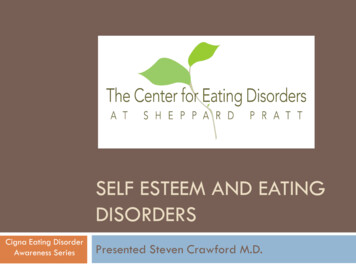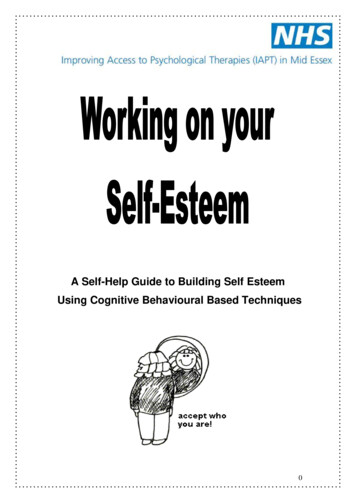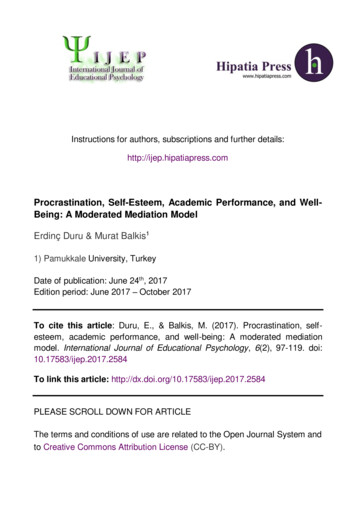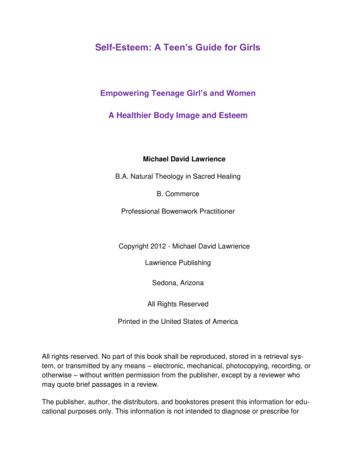
Transcription
SELF ESTEEM AND EATINGDISORDERSCigna Eating DisorderAwareness SeriesPresented Steven Crawford M.D.
Overview What is self-esteem?Factors that contribute to the development of selfesteem.Self-esteem and the development and maintenanceof eating disorders.Ways one can improve his/her self-esteem.
What is Self-Esteem?
Self-Esteem is Not . The feeling you get when you succeedInduced by a drug, a compliment, or weight lossTemporaryBased on external achievementsNarcissism
Self-Esteem Is . Experiencing oneself as being competent to cope withthe basic challenges of lifeHow we value ourselves, and how valuable we thinkwe are to othersThe experience that happiness is right and natural forusBeing worthy of happiness
Self-Respect One’s overall emotional evaluation of his or her ownself-worth. “Iam worthy.” or “I am competent.”
Self-Efficacy The belief in one’s ability to complete tasks andreach goals. “I can do this!”Plays a critical role in how we think, feel, andbehave.
The Self-Esteem EquationSelfrespectSelfesteemSelfefficacyBranden, 1997
Self-Esteem is Necessary for Survival Self-esteem is tied to a sense of personal control andcompetenceSelf-esteem is one of the best predictors of personalhappiness
Nature Certain inherent differences may make iteasier or harder to attain healthy selfesteem
Nurture Self-esteem can be nurtured when children areexposed to an environment that is filled with love respect acceptance reasonableexpectations general belief in his/her goodnessAs opposed to when children are exposed to an environmentthat ridicules, humiliates or is abusive.
Factors that Influence Self-EsteemRELATIONSHIPS ES with hiring,firing, promotion andresponsibilities at work, aswell as your ability tosupport your family.RELATIONSHIPS withchildhood and adultfriends, neighbors, andsignificant others.EXPERIENCES with clubs,sports, teams, hobbies,social events.
The Roots of Self-EsteemNature vs. NurtureGeneticInheritanceEnvironment
Core Components of Self-EsteemSelfEsteem3. Growing1.UnconditionalWorth2. Love
Self-Esteem LivingpurposefullyIntegrity
Signs of Positive Self-Esteem ConfidenceSelf-directionOptimismAn independent andcooperative attitude Feeling comfortable with awide range of emotionsAn ability to trust othersGood self-careThe ability to say no
Signs of Positive Self-Esteem Non-blaming behaviorThat includes and ability to: makemistakes and learn from them accept mistakes from others solve problems
Balanced View of SelfAn awarenessofpersonalstrengthsA goodsenseofpersonallimitations
Confidence in our ability to:ThinkindependentlyRemainFlexibleLearn fromMistakesMakeDecisions
Self- EsteemConsequences of High Self-EsteemIncreasedability to copewith life’sdifficultiesIncreasedAmbition
Low Self-Esteem A person with low self-esteem may feel unworthy, incapable, andincompetent.Low self-esteem can prevent an individual from realizing their fullpotential.Signs of Low Self-Esteem Negative view of life Perfectionist attitude Mistrusting others – even those who show signs of affection Blaming behavior Feelings of being unloved and unlovable Dependence – letting others make decisions Fear of being ridiculed
The Vicious CyclePoorPerformanceThe effects of low self-esteem cancreate a vicious cycleDistorted viewof self andothersLack of SelfconfidenceLimitedExperiences/Unhappiness
Consequences of Low Self-Esteem Low Self-Esteem can lead to compulsivity lackof achievement relationship problems behavior problems depression anxiety eating disordersMental Health has been equated with Self-Worth
Self-esteem and Eating Disorders Low self-esteem has a central role in clinical theoriesof eating disorders.Studies have shown that eating disorders areassociated with lower levels of self-esteem andperception of self concept.Research also indicates that increasing self-esteem isa significant aspect of the treatment of eatingdisorders .
gFactorsIndividualFamilyOver-evaluationof Body Shape,Weight, and SizeDieting toincreasefeelings ofSelf-worth& lturalGarner (1993)
Self-esteem and Eating DisordersIndividuals with Eating Disorderspossess a dysfunctional system forevaluating self-worth.Fairburn, 2003
Dysfunctional System for evaluatingself-worthOver-evaluation ofeating, shape, andweight and their controlWeight control behavior(dieting, self-induced vomiting, arvationSyndrome
Self-Esteem and Eating Disorders:A vicious circle Low self-esteem has been implicated in thedevelopment of eating disordersAnd . Low self-esteem is often the consequence of eatingdisorders
Self-Esteem Can Be Cultivated People can be inspired, stimulated, andcoached to practice certain ways of thinkingand behaving that will increase self-esteem.
Assess Your Self-EsteemAm I Do Ishy? Respect myself?unassertive? Deserve to be happy?avoiding aspects of life?controlling?obsessive?worthy?capable?overly focused on achievement?aggressive?confident in my ability to think, learn, and make appropriatedecisions
Cognitive Behavioral TherapyYou can change the way you feel by changing the way you think and changing what you do.
How to Begin to Make Changes Developing new thoughts and attitudes Changing behavior patterns Exposure to new experiences
You Feel The Way You Think Negative feelings do not result from bad things thathappenNegative feelings come from your thoughts aboutwhat happens
Don’t Believe Everything You Think “I’m stupid, lazy, and a failure”“Everybody is better, smarter, cuter than me”“There is something wrong with me”“I’ll never be good at anything”“I shouldn’t be so .”“I should be more ”
You Feel the Way You Think“We are not disturbed by things but bythe view we take of them”-Epictetus
Thought:“I am a worthwhile person if I am popular andpeople like and respect me”AdvantagesI’ll work hard to earnother people’s respect When people like me,I’ll feel great I won’t have to thinkfor myself. I can goalong with the crowd DisadvantagesIf someone doesn’t likeme I may getdepressed. You can’t pleaseeveryone all the time Other people willcontrol my self-esteem Other people will beable to manipulate me
Question Your Beliefs About Self-Esteem What makes a person worthwhile?
What is a Worthless Person? Someone who does bad thingsSomeone who fails or makes mistakesSomeone who is lazy, unproductiveSomeone whom nobody likesSomeone who can’t do anything rightSomeone who does not have any talent
Question Your Beliefs About Self-Worth Think of someone you knew or admired who you feltwas especially worthwhile. What was it that made him or her worthwhile?
Self-Esteem Self-esteem is the capacity to like andrespect yourself even when you don’tsucceed.
How to Begin to Make Changes Developing new thoughts and attitudes Changes in behavior patterns
Self-Monitoring Thoughts Use daily thought record dailyrecord of upsetting events identify distorted thinking generate more realistic, positive thoughts
Thought RecordingEventThoughtFeelingD on exam“I’m a failure. I’mShamestupid. I’ll never be a Panicsuccess at anything.”
Thought elingD on exam“I’m afailure. I’mstupid. I’llnever be asuccess atanything.”ShamePanic“I do havea 3.6 GPA.I guess onetest doesn’tdiscount allthe rest ofmy goodgrades. Iusually dowell ontests, so IwillprobablyDisappointed but notdevastated
Cognitive DistortionsDistortionExampleAll-or-nothing thinking“If I am not performing perfectly, then I’ma loser.”Overgeneralization“I always ruin everything!”Jumping to ConclusionsYour friend is more quiet than usual, youthink, “he’s mad at me, what did I dowrong?”Discounting the PositiveSomeone compliments you on your work,and you reply with, “Anyone could dothat.”LabelingYou miss a basketball shot and say, “I amthe biggest loser ever!”MagnificationA student answers a professor’s questionincorrectly, and immediately thinks, “Howawful, now he thinks I’m stupid and I amgoing to fail, and never graduate.”
How to Begin to Make Changes Developing new thoughts and attitudes Changes in behavior patterns
What are some situations that make you feel inferioror low on self-esteem? Identify the situations e.g.,social Identify your emotional reactions (e.g., sad, rejected)Identify your thoughts (e.g., settings, when being judged)I’m not as good as )Identify your typical response (e.g.,what do you do?)
Increase Your AwarenessIdentify situations where you feel low in nxious,embarrassed“I don’t haveAvoid Partiesanythingimportant to say.People don’t wantto talk to me.”
Challenge Your us,“I don’t have Avoid Partiesembarrassed anythingimportant tosay. Peopledon’t want totalk to me.”MoreRealisticThought“Maybe I’mbeing tooextreme. It’snot true thatI never havesomething tosay. Andthere’s noevidencereally thatI’m any moreboring thananyoneelse.”
Challenge Your Response More adaptive reaction: Don’t avoid Develop goplan for going to next partywith a friend stay for brief time start with a small gathering practice positive self-talk talk to 3 new people
Behaviors that Build Self-Esteem Increase pleasurable activities Increase rewarding activities Increase activities that promote self-reliance
Monitoring Pleasurable ActivitiesActivity :Pleasurable/RewardingCompanion:Self or OthersPredicted Satisfaction0%-100%Actual Satisfaction0%-100%
Monitoring Pleasurable ActivitiesActivity :Art LessonCompanion:Other studentsPredicted Satisfaction50%Actual Satisfaction80%
Monitoring Pleasurable ActivitiesActivity :Binge-eatingCompanion:SelfPredicted Satisfaction70%Actual Satisfaction40%
Building Self-EsteemReview Assess your self-imageIncrease awareness of your thoughts of selfIncrease understanding of self-worthMonitor and challenge distorted thinkingMonitor and challenge negative behaviorsIncorporate pleasurable, rewarding behaviorPractice every day
Conditional Self-Esteem “I am a worthwhile person because” Ihave done my best I am loved I am kind of my success I work hard
Conditional Self-Esteem If I do not succeed, do I think . “Ihave failed” “Iam a failure”
Unconditional Self-Esteem You are already worthwhile, you don’t have to earnit.You are worthwhile because you are a human being
Unconditional Self-EsteemAdvantages I will know I am worthwhile even when I’m having atough timeI won’t be so afraid of failure/rejectionI will always feel equal to other peopleI won’t have to get so defensive when I’m criticizedmy self-esteem won’t be on the lineI can enjoy life more because I won’t use up all myenergy worrying about whether I’m good enough
SELF-ESTEEM“OF ALL THE JUDGEMENTSWE PASS IN LIFE, NONE ISMORE IMPORTANT THAN THEJUDGEMENT WE PASS ONOURSELVES.”Nathanial Braden, Ph.D. (1997)
QUESTIONS?www.EatingDisorder.org(410) 938-5252
Self-esteem and Eating Disorders Low self-esteem has a central role in clinical theories of eating disorders. Studies have shown that eating disorders are associated with lower levels of self-esteem and perception of self concept. Research also indicates that increasing self-esteem is a










